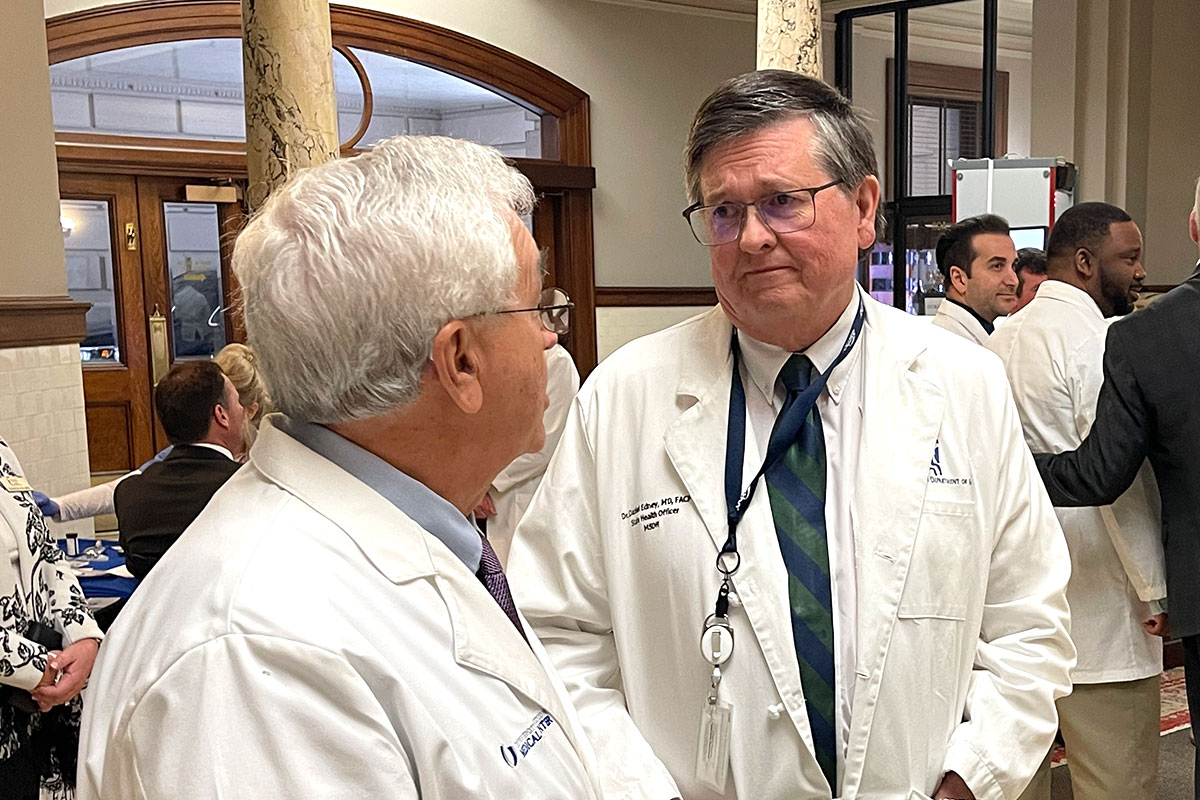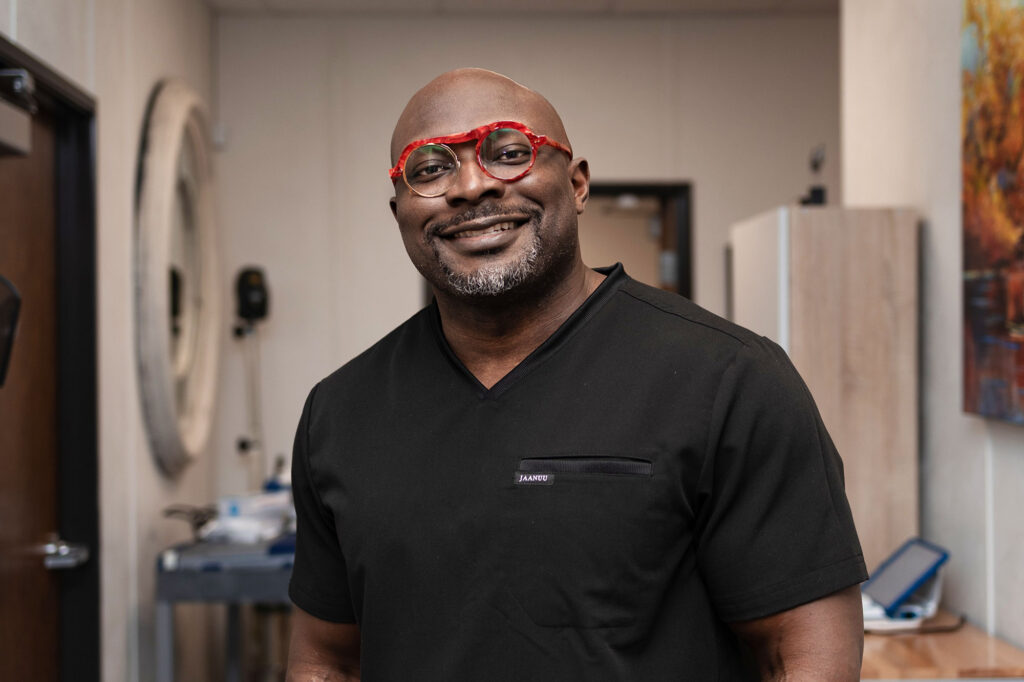With Mississippi leading the nation in amputations, some doctors and health officials are working to reduce the number of amputations caused by peripheral artery disease.
Mississippi’s rate of 129.7 amputations per 100,000 residents is more than double the national average of 45.5 per 100,000 people, American Heart Association data shows.
Peripheral artery disease is when a blood vessel outside of the heart narrows and causes poor circulation. PAD can occur in the arms and legs, but Cardiovascular Solutions of Central Mississippi Interventional Cardiologist Dr. Foluso Fakorede said the disease more commonly affects patients’ legs and feet.
“It affects close to 21 million people, and primarily those who have diabetes or a history of nicotine use or people who have history of high blood pressure and anyone who’s had plaque build-up or blockages in their heart or brain. So (with) heart disease or stroke, there’s a high prevalence of peripheral artery disease. But it’s the least aware of all cardiovascular diseases,” he told the Mississippi Free Press on April 9.
Symptoms of Peripheral Artery Disease
Dr. Foluso Fakorede said one of the reasons why many people are unaware of peripheral artery disease is because it is a “silent epidemic,” meaning patients may not have serious side effects from the disease, or if they do, they do not know it is a symptom of PAD.
About 15% of PAD patients experience some symptoms, like feeling pain or numbness in one’s legs or feet while walking, he said. But 50% of PAD patients have no symptoms at all, he added, and 33% have “atypical symptoms,” like restless leg syndrome.
“If left silent and something’s building up in your artery, it’s going to narrow that vessel. And if it’s not screened and treated on time with medicines or with exercise, it leads to a non-healing wound or an ulcer,” Fakorede said. “… We call that the extreme stage of peripheral artery disease.”
The extreme stage, or acute limb ischemia, causes serious pain and limb damage that could paralyze patients or cause them to feel pain, tingling sensations, loss of pulse or coldness in their arms or legs. Fakorede said that 50% of patients who have the extreme stage of PAD could die within a year of diagnosis, especially if they do not get the affected limb amputated. But risks still come with amputations.
“If you’re amputated, 80% of them will die within five years, so this is a death sentence,” he said.
Prevent Peripheral Artery Disease
Dr. Foluso Fakorede called on the Mississippi State Department of Health to recognize the state’s “diabesity” problem; Mississippi has the nation’s highest rates of diabetes and obesity in the country.
Mississippi State Health Officer Dr. Daniel Edney said MSDH has been tracking peripheral artery disease and amputations while educating the public on the fact that the Delta has the highest rate of leg amputations in the country. MSDH’s Lower Extremity Amputation Prevention Program works to educate patients about the risks of PAD and how to prevent it.
“We need to be diagnosing diabetes and hyperlipidemia at earlier stages, intervening and educating folks about the seriousness of it,” he told the Mississippi Free Press on April 11.

Fakorede said people can help prevent getting peripheral artery disease by eating healthily, particularly with a plant-based or Mediterranean diet with low sugar and by drinking plenty of water. He also said people should do 150 minutes of moderate to severe-intensity exercise weekly.
“It would help if there were access to a lot of gyms or facilities that are free for people who are poor or people who are underinsured in the region,” Fakorede said.
The American College of Cardiology’s data shows that about 80% of people with PAD currently or formerly smoked cigarettes, so Fakorede recommends avoiding nicotine products to reduce the chance of developing PAD.
People at risk of PAD should check their feet daily for sores, blisters, bruises, cuts, calluses, swelling and any other changes to the skin and toenails. Washing one’s feet daily and wearing shoes when walking indoors and outdoors can also help reduce the risk of PAD.
If a person is at risk of developing PAD or diabetes and has insurance, Edney said he or she should visit the doctor yearly for a wellness exam. MSDH’s Know Your Numbers program allows any Mississippian with or without insurance to visit a county health department to get their blood pressure and blood sugar checked for free without an appointment.
“If we find severe problems, then we will work to get them into a medical home or we’ll help take care of them ourselves if there’s nobody else to do it,” Edney said.
Fakorede said children are developing diabetes at high rates, and he emphasized the importance of educating young people about disease prevention and building healthy habits. He said people should also get doctors to check their circulation and tell their friends and family to look out for signs of PAD.
“The lifestyle of the average Mississippian is very conducive to peripheral arterial disease,” Edney said. “So if you have a diet that’s high in fat, cholesterol and a high calorie diet that leads toward obesity, then that’s going to lead you to a much higher risk of peripheral arterial disease.”
Inequities in the Health-Care System
For a doctor to diagnose a patient with peripheral artery disease, he or she must do a screening of the patient. Dr. Foluso Fakorede, however, said many patients do not get screened in a timely manner.
The U.S. Preventative Task Force decides who can get screenings for preventative services, and Fakorede said the task force does not have a “favorable recommendation” for doctors to screen patients for PAD despite “evidence that the worst place to get amputated in this country is here in the South, especially in a state like Mississippi.”
He said people of color are twice as likely to develop peripheral artery disease, but communities of color are less likely to know the effects of the disease. Black people with PAD are four times more likely to have an amputation compared to white people with PAD, he added.
Mississippi leads the nation in amputations caused by PAD “because we have failed to address what we call the social determinants of health,” Fakorede said. He added that limited health-care access combined with systemic racism in infrastructure and the health-care system leads to higher rates of strokes, heart attacks, diseases and amputation for Black residents.
To lower Mississippi’s rates of disease, Fakorede said state and federal officials should help improve citizens’ quality of life by increasing access to health care, insurance, housing, transportation and education. The government should make medicine and treatment affordable for people, he said.
The fact that Mississippi has the least amount of doctors and specialists per capita in the U.S. means its people have the highest rate of chronic diseases, Fakorede added. Mississippians are more likely to be underinsured, and the State’s failure to expand Medicaid over the past decade does not help, he said. Lawmakers in the Mississippi House and Senate are currently negotiating a plan that could expand Medicaid for some residents, however.
Dr. Daniel Edney said the focus on health care needs to extend to primary care providers.
“The discussion has got to shift away from talking about just hospitals to talking about all of health care,” he told the Mississippi Free Press on April 11. “Our patients need hospitals, but first and foremost, they need doctors and providers who can provide them basic primary care, medication, prevention, screening, education and early intervention for disease management. That does not occur in the hospital; it occurs in clinics.”
Those who cannot access health care are at the highest risk of developing PAD and other diseases, he noted.
“What I endorse is doing whatever it takes to allow every Mississippian to have the same access to primary medical care that I have,” Mississippi’s state health officer said. “… We can’t leave anyone behind.”










